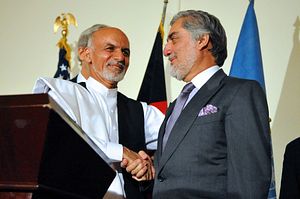2015 was a year full of ups and downs for both the Afghan people and their government, and, by the same token, for the international community and the region as a whole. The rise and expansion of security threats in the form of the Islamic State, the growing insecurity in northern Afghanistan, the fall of Kunduz into the hands of Taliban, and the exodus of Afghans into Europe are marked failures. On the other hand, the kicking off of the TAPI Project, accession of Afghanistan into the WTO, the development work of Salma Dam, and building regional consensus by involving regional and global players in the Afghan conflict are recorded as successes by the National Unity Government of Afghanistan.
The Failures of 2015: From Security to Brain-Drain
The Taliban’s fragmentation
After news of the death of the Taliban’s leader Mullah Omar was leaked by Afghan intelligence, the Taliban divided into two groups, with one led by Mullah Akhtar Mansour and the other by Mullah Mohammad Rassoul. The Afghan government failed to make use of the initial internal division to gain the upper hand. Of course, whether it was possible to gain an advantage is debatable because of the security gaps and internal fragmentation in the National Unity Government itself. Moreover, the rise of the Islamic State is, in part, a product of the Taliban fragmentation.
The fall of Kunduz
The fall of Kunduz and the Taliban’s brief control thereof was significant for two reasons. First, it demonstrated that the Taliban is far stronger and more organized than before and has the ability to challenge the writ of the government. Secondly, the fall of Kunduz highlighted not only the significant gaps in the government’s security institutions, but also how those gaps are exacerbated by internal problems and disagreements plaguing the National Unity Government.
Failing to form a consensus
The Afghan National Unity Government’s internal issues are most reflected in its inability to form a consensus over appointing key candidates for security posts, such as the defense minister, and on key policy endeavors. A critical policy endeavor such as the signing of an intelligence agreement between the Afghan National Directory of Security (NDS) and the Pakistani intelligence agency (ISI) was sabotaged in part by internal fragmentation.
The rise of the Islamic State
Further confounding the security problems in 2015 was the rise of the Islamic State in the eastern and southern parts of Afghanistan, which are traditionally Taliban stronghold areas. The Islamic State is likely to continue gaining ground in the absence of solutions for these security failures, the continued fragmentation of both the Taliban and the National Unity Government, and a failure to bring about peace and reconciliation.
Migration and the resultant brain-drain
While the deteriorating security situation and the increase in violence are driving factors in the recent uptick in numbers of Afghans fleeing the country, it is not the only cause leading to their exodus. The stagnant economy and a lack of employment opportunities are also leading factors. Leaving Afghanistan is no guarantee of prosperity for those fleeing in the long term. With the support of the young and the people across the divide, the National Unity Government can pursue a balanced approached to both development and security — it must be able to pursue a path of sustainable security.
The Gains of 2015: From Awareness to Action
One of the major achievements of the NUG government was bringing to light the predicament the country is facing and pursuing a regional approach to help facilitate peace and stability. Regional actors have a stake in stability in Afghanistan. President Ashraf Ghani and the National Unity Government tirelessly strove to drive that point home to not only the people of Afghanistan, but to leaders across the region.
Ghani partnered with regional actors to bring about much needed improvements in Afghanistan’s infrastructure. For example, the NUG signed an agreement with India to facilitate the development of the Salma Dam, located in the southwestern province of Herat, to produce electricity and to help with the irrigation of the land of local farmers. Infrastructure development and projects in rural areas have been seriously neglected in the past.
Enabling future infrastructure development was another success last year. In particular, the inauguration of the TAPI (Tajikistan, Afghanistan, Pakistan, and India) pipeline stands out. The pipeline will transfer energy to the energy-hungry states of Pakistan and India via Afghanistan. It will also have salutary benefits for Afghanistan by enabling it to meets its own energy demands while simultaneously generating income, investment, and development in other sectors of the Afghan economy.
Finally, Ghani successfully convinced China and Central Asian states to play an active role in bringing peace and stability. He also sought to mend ties with Pakistan, an initiative which the United States, China, and Russia have supported.
As 2016 begins, Afghans far and near should ponder their dreams. The dreams of each and every Afghan, from those who are old to those who have yet to be born, are tied to the decisions made today and the actions taken tomorrow. Afghans will not be able to grow as individuals, as a people, and as a nation without looking to the past — without contemplating both the successes and failures of those who came before — and without committing to working together for the future.
Aziz Amin Ahmadzai writes on political, security and social issues of South Asia, West and Central Asia. He is based in Kabul and tweets at@azizamin786.

































